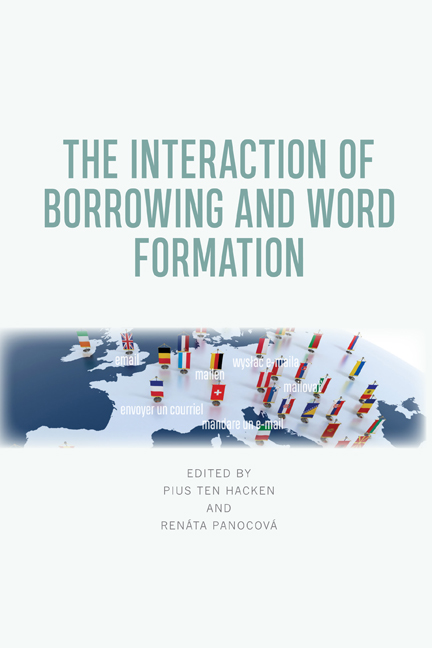Book contents
- Frontmatter
- Contents
- List of Figures and Tables
- List of Contributors
- Preface
- List of ISO-639 Language Codes
- Introduction
- 1 Word Formation, Borrowing and their Interaction
- Part I Compounding
- 2 Compounding and Contact
- 3 Neoclassical Compounds between Borrowing and Word Formation
- 4 Borrowed Compounds, Borrowed Compounding – Portuguese Data
- 5 Compound Calques in an Eighteenth-Century German-Lithuanian Dictionary
- 6 (Pseudo-)Anglicisms as Nominal Compounds in Italian
- Part II Affixation
- 7 The Role of Borrowing in the Derivation of Passive Potential Adjectives in Polish
- 8 How an ‘Italian’ Suffix Became Productive in Germanic Languages
- 9 The Suffixes -ismus and -ita in Nouns in Czech
- 10 The Interaction between Borrowing and Word Formation: Evidence from Modern Greek Prefixes
- Part III Naming in Minority Languages
- 11 Loanword Formation in Minority Languages: Lexical Strata in Titsch and Töitschu
- 12 Examining the Integration of Borrowed Nouns in Immigrant Speech: The Case of Canadian Greek
- 13 Interaction among Borrowing, Inflection and Word Formation in Polish Medieval Latin
- Conclusion
- 14 Trends in the Interaction between Borrowing and Word Formation
- Author Index
- Subject Index
13 - Interaction among Borrowing, Inflection and Word Formation in Polish Medieval Latin
Published online by Cambridge University Press: 22 September 2020
- Frontmatter
- Contents
- List of Figures and Tables
- List of Contributors
- Preface
- List of ISO-639 Language Codes
- Introduction
- 1 Word Formation, Borrowing and their Interaction
- Part I Compounding
- 2 Compounding and Contact
- 3 Neoclassical Compounds between Borrowing and Word Formation
- 4 Borrowed Compounds, Borrowed Compounding – Portuguese Data
- 5 Compound Calques in an Eighteenth-Century German-Lithuanian Dictionary
- 6 (Pseudo-)Anglicisms as Nominal Compounds in Italian
- Part II Affixation
- 7 The Role of Borrowing in the Derivation of Passive Potential Adjectives in Polish
- 8 How an ‘Italian’ Suffix Became Productive in Germanic Languages
- 9 The Suffixes -ismus and -ita in Nouns in Czech
- 10 The Interaction between Borrowing and Word Formation: Evidence from Modern Greek Prefixes
- Part III Naming in Minority Languages
- 11 Loanword Formation in Minority Languages: Lexical Strata in Titsch and Töitschu
- 12 Examining the Integration of Borrowed Nouns in Immigrant Speech: The Case of Canadian Greek
- 13 Interaction among Borrowing, Inflection and Word Formation in Polish Medieval Latin
- Conclusion
- 14 Trends in the Interaction between Borrowing and Word Formation
- Author Index
- Subject Index
Summary
In contrast to the majority of chapters united in this volume that report on research conducted on modern languages, the present study analyses two historical languages by discussing classes of words attested in Polish Medieval Latin which might be interpreted both as borrowings (or loan translations) from Old Polish and as products of regular Latin word formation. Section 1 provides basic information on research data and indicates the specificity of Medieval Latin in terms of linguistic and extra-linguistic aspects. Section 2 provides a more detailed insight into the Latin used in medieval Poland. The degree of interplay between Latin and Old Polish is of particular interest, with emphasis on inflectional morphology as the method of transferring vernacular stems into Latin. Section 3 considers the role of inflection in Latin word formation from a more general perspective and discusses the competition between inflection and word formation as operations in Polish Latin. Section 4 distinguishes some lexico-semantic classes within which there may be interaction between borrowing and word formation. In addition, the section proposes a few more precise criteria for determining whether inflection or word formation operations have taken place in cases when lexemes with Latin stems appear and demonstrate ‘unexpected’ semantic and morphological parallels to Polish lexico-semantic classes. Further, the section evokes a series of agent names in Polish and Czech Latin in the light of the Štekauer's onomasiological theory, thereby referring to the loan translation mercipotus (‘the sealing of a deal by making a celebratory toast’) as a possible manifestation of the continuity between competition and collaboration. Section 5 summaries the conclusions.
The position of Latin in medieval Poland
The present study is based on data from the Polish Medieval Latin dictionary (Lexicon mediae et infimae Latinitatis Polonorum, LMILP), and draws from Weyssenhoff- Brożkowa (1991) which deals with the influence of Old Polish on Polish Medieval Latin, as well as from Rzepiela (2005) which treats word formation in Polish Medieval Latin. The data were also verified in related text sources and in the Electronic Corpus of Polish Medieval Latin (eFontes).
- Type
- Chapter
- Information
- The Interaction of Borrowing and Word Formation , pp. 259 - 278Publisher: Edinburgh University PressPrint publication year: 2020



